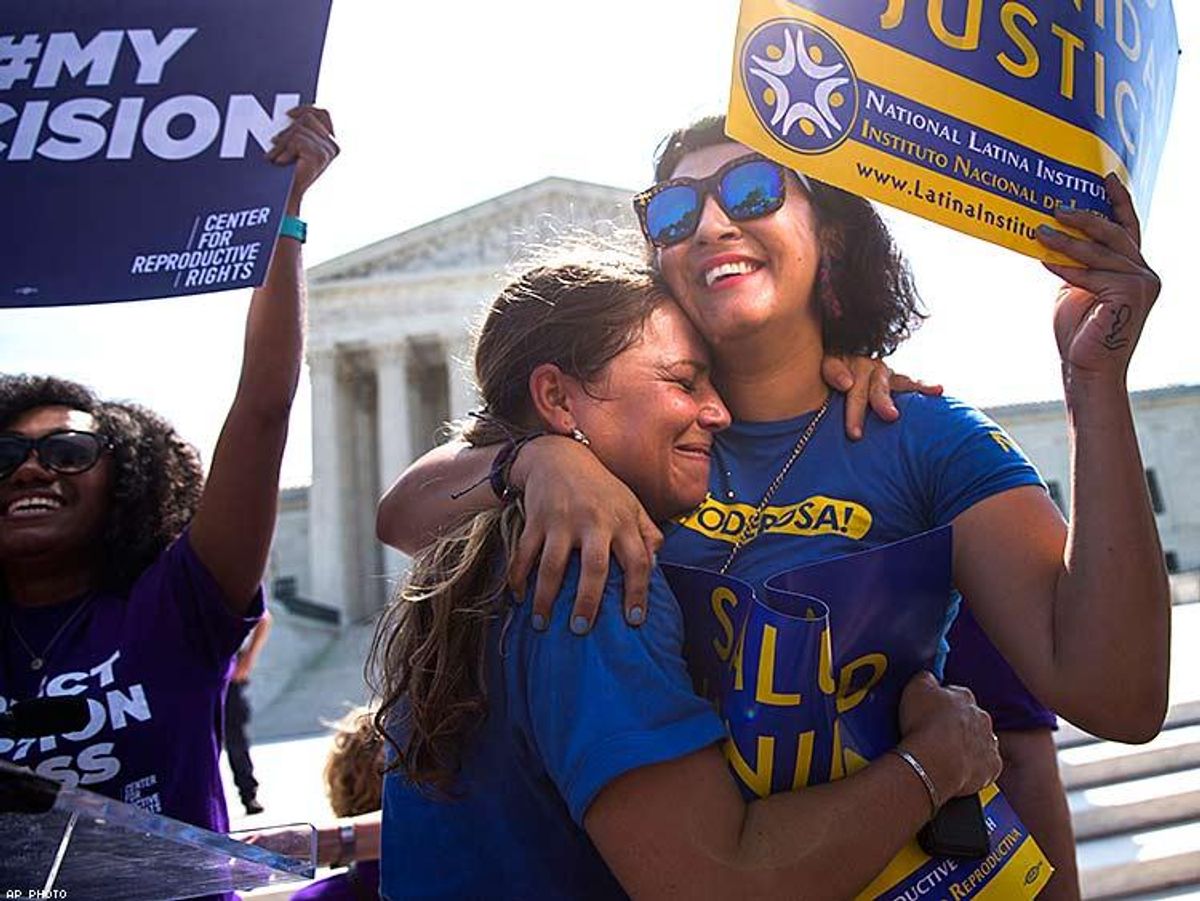On Monday, the U.S. Supreme Court, in the case Whole Woman's Health v. Hellerstedt, struck down two onerous and medically unwarranted restrictions on abortion. The 5-3 ruling came in a legal challenge to the Texas legislature's harmful anti-abortion law, House Bill 2, passed in 2013. HB 2 was enacted to make safe abortion care more difficult to provide and obtain and has resulted in the closure of nearly 75 percent of the clinics in the state of Texas, forcing some women to drive up to 300 miles one-way to obtain safe and legal abortion care.
While this case was one of the most important to address abortion rights in recent years, it also has implications well beyond women's access to constitutionally protected reproductive health care. Reproductive health centers and abortion clinics have come to occupy an important space in the provision of health care to the LGBT community.
The movements for LGBT equality and reproductive freedom share profoundly similar goals -- to protect the fundamental right to bodily autonomy, challenge traditional gender norms, and secure the freedom of individuals to form families on their own terms. The two movements share a core belief that our most personal decisions should be free from government interference. But the intersection between the movements does not occur only at the level of principle and policy. Reproductive health clinics are embracing the LGBT community and creating welcoming spaces and health care services designed to serve those who have not always found the health care system hospitable.
For example, the Allentown Women's Center, an abortion clinic in Bethlehem, Pa., has developed and actively promotes a Trans* Health Initiative, including hormone replacement therapy and counseling referrals. The clinic is actively seeking to transform the way transgender people receive care, to eliminate barriers to achieving maximum health and well-being, and to provide a safe, comfortable and respectful clinic for all transgender and gender-nonconforming people. The program grew organically in response to community needs, and the staff saw it as "dovetailing beautifully with abortion care" because of the stigma surrounding both abortion care and LGBT people. They are now serving over 100 transgender patients in the Lehigh Valley.
Cedar River Clinics, an abortion provider in Washington State, offers LGBTQ health care, from a range of wellness services (annual pelvic and breast exams, cancer screenings, HIV and STD testing, safer sex education) to transgender services (hormone therapy, surgical referrals, postsurgical follow-up, and clerical services for gender marker changes). While many LGBT patients came initially for hormone therapy and gender-affirming services, they end up getting much more - it has served as an entry point into the health care system for many who had avoided seeking health care due to harmful and discriminatory experiences, and the clinics have frequently diagnosed chronic conditions previously undetected and untreated. The clinics' Transgender Health Care Toolkit, released in March, has been accessed by over 200 health care providers in the U.S. and abroad. Cedar River also offers insemination services, which it views as fundamentally part of its mission to facilitate full choices around family formation.
Because "members of the lesbian, gay, bisexual, trans, and queer (LGBTQ) community face greater obstacles to obtaining and benefiting from sexual and reproductive health services than non-LGBTQ people," Planned Parenthood clinics provide "high-quality, sensitive, and appropriate reproductive health, general health, and sexual health services to all of our lesbian, gay, bisexual, and transgender (LGBT) patients," as the organization states online. At the end of last year, Planned Parenthood started offering HIV prevention drugs at its West Hollywood location, with plans to expand the service to all 20 of its Los Angeles-area facilities.
In addition to providing essential reproductive health care services, providers of abortion care affirm women's dignity to make the most essentially personal and private decisions about themselves and their families. The notion of individual dignity is what propelled us to marriage equality -- and these clinics are affirming the dignity of LGBT people by providing welcoming and nonjudgmental health care.
When the ability to access safe and legal abortion is threatened, those of us in the LGBT community must not view it as someone else's fight. Beyond the obvious fact that we need reproductive health care services, including abortion care, ourselves, attacks on abortion rights and on the equal rights of LGBT people often emanate from the same places. The political agenda to control the gender roles, sexuality, and the family formation choices of others drives the opposition to safe and legal abortion and to full LGBT equal dignity. And when community-based reproductive health care clinics close their doors, more than just abortion access is lost.
With its decision in Whole Woman's Health the Supreme Court has affirmed that women seeking abortion care deserve compassion, respect, and dignity when making their own personal health decisions. The decision was also an important repudiation of the misuse of bogus health and safety arguments to undermine fundamental rights, flatly rejecting the lower court's extreme deference to the Texas legislature's unsupported pronouncements about HB 2's supposed health benefits. This is an important victory for LGBT people, who have also been harmed by disingenuous medical arguments used to support curtailing our civil rights, and who often depend on abortion providers for access to health care with dignity and respect. But we must not be complacent; the unrelenting attacks on abortion will continue. And in Texas the clinics that were forced to close by these sham laws will not be able to reopen overnight; some might not come back online at all. All of us who care about protecting the dignity of all people in their decisions around sexuality and family formation must engage in the fight to ensure that our laws keep those protections secure. We must speak up and show up so each of us can get the health care we need with dignity and respect.
JULIANNA S. GONEN is the policy director for the National Center for Lesbian Rights.


















































































